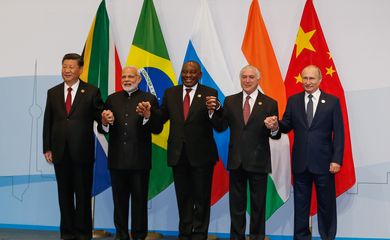Brazil trade with Brics partners on the rise
The 10th Brics Summit Meeting, with heads of state from Brazil, Russia, India, China, and South Africa, in Johannesburg, brings to the fore a change in the bloc’s agenda.

The group of countries was formed in the wake of the international financial crisis of 2008, aimed at increasing the participation and the voting power of emerging countries in multilateral institutions like the World Bank and the International Monetary Fund.
“The main goal of the association was to overhaul global financial governance institutions,” said Guilherme Casarões, International Relations Professor at the Getulio Vargas Foundation.
According to the expert, instead of the former agenda, member states have fostered multilateral trade and made strides in the creation of the New Development Bank, also known as “Brics Bank,” which may have a regional office in São Paulo after a decision is made by the summit.
Limits
In Casarões’s view, Brics “is not a bloc in China’s tow,” but the inequality among economies limits the trade potential between partners. Brazil’s export agenda, for instance, stands out for the prevalence of goods with lower aggregate value, like meat, soybeans, and iron ore.
To his judgment, today’s political landscape in Brazil, where general elections are slated to be held on October 7, deprives current negotiators of leeway. “The uncertainties regarding the elections make it hard for Brazil to take definitive stances, among them the one concerning the dispute between China and the US,” he pointed out.
Marcos Jorge de Lima, Brazil’s Minister of Industry, Foreign Trade, and Services, admits that the country’s political future “whets one’s curiosity,” but, regarding the permanent character of commercial policies, he noted that “bureaucracy is solid, built with public careers like the diplomatic and foreign trade bodies, which are to continue working with a state vision. The instruction is: keep moving forward.”
The ministry released figures that show the increase in trade with Brics partners. “From January to June this year, Brazil exported $33.1 billion to Russia, India, China, and South Africa. A 5.4% climb was reported from the same period last year, when sales to these countries added up to $31.4 billion. In the same time span, imports amounted to $18.3 billion, leading to a commercial surplus of $14.8 billion.”




